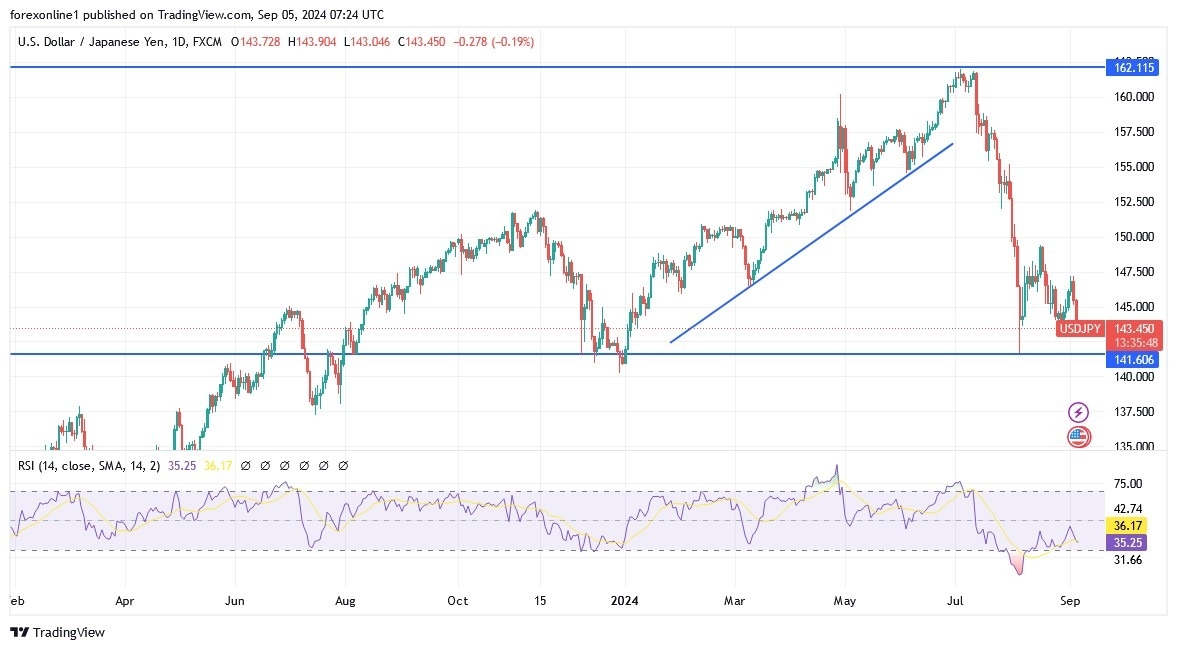- The Japanese yen has risen to the brink of the 143.00-yen level against the US dollar, recovering sharply from its two-week low as weak US manufacturing data fuelled recession fears, boosting demand for safe-haven assets.
- Also, Investors adopted a cautious stance ahead of the crucial US jobs report, which could impact the magnitude of the expected US interest rate cut by the Federal Reserve this month.

On the local front, investors continued to assess the outlook for the Bank of Japan’s monetary policy. Recently, the Bank of Japan’s policymakers said they were ready to adjust monetary settings if their economic expectations materialize. Concurrently, financial markets are betting that the central bank will raise interest rates again in December.
On the economic front, according to the results of the economic calendar, the data showed that the manufacturing purchasing managers index in Japan was revised slightly higher to 49.8 from 49.5 in August, which is close to stability. At the same time, the service sector purchasing managers index was revised down but remained expansionary.
On the stock trading platforms front, Asian markets decline with Wall Street’s decline. Asian stock markets fell sharply on Wednesday, tracking losses in US stocks on Wall Street overnight as technology stocks sold off and weak US manufacturing data raised recession fears. Technology-based stocks in Japan, South Korea and Taiwan led the region lower, falling about 3%. Chip stocks such as Tokyo Electron, Advantest, SK Hynix, Samsung Electronics and Taiwan Semiconductor suffered heavy losses. Stocks in Australia, Hong Kong and China also fell.
On the other hand. Japan’s 10-year bond yields fall despite strong wage data.
According to trading, the yield on the 10-year Japanese government bond fell to around 0.87%, its lowest level in two weeks, even after data showed that real wages in the country rose for the second consecutive month in July, boosting expectations for a tighter monetary policy by the Bank of Japan. Real inflation-adjusted wages rose 0.4% year-on-year in July as total cash earnings increased 3.6%. This is in line with the Bank of Japan's forecasts for moderate economic growth, rising wages, and higher overall inflation. Japanese government bond yields were also pressured by increased demand for safe-haven assets as weak US manufacturing and Labor market data fuelled recession fears. Furthermore, markets are betting that the Federal Reserve will have to cut interest rates more aggressively to avoid an economic recession.
Top Forex Brokers
USD/JPY Technical Analysis and Expectations Today
According to the performance on the daily chart attached, the downward trend of the USD/JPY is getting stronger and is on its way to move towards the next most important support level 141.75, the lowest for the currency pair during the year 2024. Clearly, that may move all technical indicators towards strong oversold levels. On the other hand, and over the same period of time, there will be no strong shift in the general trend to an upward trend without returning to the psychological resistance area of 150.00 again. Ultimately, the USD/JPY price will continue to be strongly and directly affected by the future policies of global central banks and the extent of investors' appetite for risk or not.
Ready to trade our daily forex forecast? Here are the best forex brokers in Japan to choose from.
